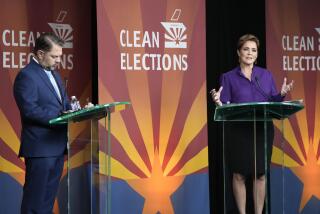Bush Absent but Still on the Minds of His Opponents as They Debate
- Share via
TEMPE, Ariz. — Four Republican presidential candidates met for the third time Sunday to debate issues without the man polls show Republican voters prefer for the job: Texas Gov. George W. Bush.
Three of the debaters criticized Bush’s absence from the televised forum in response to a question from moderator Robert Novak about what each candidate would ask Bush, were he there.
“I want to talk to you, not to him,” former U.S. Ambassador Alan Keyes said dismissively, gesturing to the audience at Arizona State University.
Only Arizona Sen. John McCain refrained from the Bush bashing. “The best thing to do is not to talk about people when they’re not there to respond,” he said later.
Sunday’s forum covered familiar ground as the candidates met for their third go-round, swinging from domestic issues such as preserving Social Security and reforming managed health care to America’s role being--in Utah Sen. Orrin G. Hatch’s quip--”the global 911 call.”
Each candidate accused the Clinton administration of misusing the country’s military. All refused to rule out armed intervention in the event of threats to U.S. national interests. They also roundly condemned Russian violence in Chechnya and said the U.S. should withhold all aid until it ends. Bush made similar comments in a televised interview earlier Sunday.
Referring to the Russian leadership as “gangsters,” Forbes said, “Tell the klepto-crats in the Kremlin, ‘Not a penny more.’ ”
Sunday’s forum at an auditorium on the university campus was sponsored by the school’s student association and the Arizona Republican Party. The candidates took nine questions apiece during the hourlong event from a pair of moderators.
In addition to Bush, former Reagan administration official Gary Bauer missed the debate Sunday. Both are expected to join their GOP colleagues onstage next month for another forum to be held in New Hampshire, where the nation’s first presidential primary will be held Feb. 1. McCain has forced Bush into a virtual tie among GOP voters in that state, polls show.
At one point Sunday, Keyes drew laughs from the audience for suggesting that Bush would make an ideal press secretary because “he says what you put into his mouth.” Without naming Bush, Hatch took a jab at the front-runner’s record-breaking fund-raising pace saying: “It’s tough to talk about fiscal conservatism and runaway spending if you’re spending that kind of money just trying to win the nomination.”
Mike Hull, executive director of Bush’s Arizona campaign, literally leaped to the stage after the debate concluded about 8 p.m. PST to pass out statements defending the front-runner. He said Bush was in Bryan, Texas, Sunday attending a memorial service for students killed in the collapse of a bonfire tower at Texas A&M; University--though Bush announced far earlier that he would not be present at the debate.
McCain, a senator from Arizona for 13 years, was clearly the favorite of the crowd Sunday. Arizona is a key battleground in the Republican race, because its primary is scheduled just three weeks after New Hampshire’s and shortly before California and other states will vote March 7. It is considered an essential victory for McCain, but it is also a top priority for Forbes, who won the Arizona primary in the 1996 presidential contest.
Forbes acknowledged his previous showing by commenting in his opening remarks, “After 1996, we do feel Arizona is our second home.”
While Forbes accented his comments with hand gestures, McCain punched them with closed fists. The Arizonan paced near his lectern, hammering on his campaign theme of campaign finance reform and removing the taint of special interest money from the political process.
Hatch accused McCain of having brought up a reform bill, which stalled in Congress, that would have killed the Republican Party.
“If that bill passed, our party would be dead,” Hatch said. He said the money from wealthy donors is critical for voter-registration and turnout drives.
Later in the debate, McCain defended his efforts to end the practice of donating “soft money,” or money channeled through political parties. Calling it a “soft-money shakedown,” he said, “That’s what it is, Orrin, a shakedown.”
But the candidates’ comments became echoes when they were asked to name their role models. All four named Jesus Christ and their parents--in that order--and most added Abraham Lincoln, George Washington and Ronald Reagan.
More to Read
Get the L.A. Times Politics newsletter
Deeply reported insights into legislation, politics and policy from Sacramento, Washington and beyond. In your inbox twice per week.
You may occasionally receive promotional content from the Los Angeles Times.










